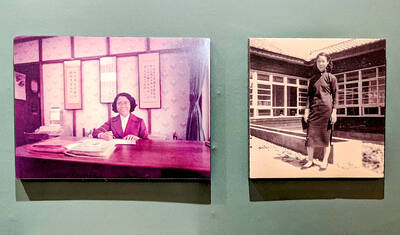In its latest POP Cinema program, Spot — Taipei Film House (光點—台北之家) is offering retrospectives on British theater and film director Peter Brook and French comedic filmmaker Jacques Tati in one festival entitled Body & Space.
Brook’s latest theatrical work, Warum Warum, will be staged at the Taipei National University of the Arts from Aug. 28 to Aug. 30, but before then the POP Cinema program features an essential list of the 84-year-old artist’s films and TV productions.
Brook’s lineup includes Moderato Cantabile (1960), based on Marguerite Duras’ novel of the same title and starring Jeanne Moreau and Jean-Paul Belmondo; a condensed version of the landmark TV production The Mahabharata (1989), which was adapted from the Indian epic of the same name; his excellent 1963 adaptation of Lord of the Flies; and the groundbreaking Marat/Sade (1967).
The Tati program includes his best-known films, Monsieur Hulot’s Holiday (1953), Mon Oncle (1958) and Playtime (1967), all of which star a timeless character, Hulot, whose clumsy and quixotic struggle with modern-day life is a hilarious commentary on the obsession with modernity and consumerism that prevailed in post-World War II France. Also included in the program are rarely screened Tati shorts dating back to the 1930s.
Monsieur Hulot’s Holiday introduces Hulot, a gauche, raincoat-wearing pipe-smoker who in Mon Oncle has a hard time adapting when he moves from rural France to his sister’s ultramodern house in the city. In Playtime, the most expensive of Tati’s movies (it was the biggest-budget film in French history when it was made and it nearly bankrupted its director), Hulot wanders through a cold, futuristic glass-and-steel Paris.
The festival will screen seven works from Tati’s oeuvre, three shorts and six feature films. All the copies are newly restored.
“There exist two worlds in each of his films: a world of the past and the arrival of a new one. The inability to fit in with the modern space is comically expressed through Tati’s bodily clumsiness,” curator Wang Pai-chang (王派彰) said.
Body & Space runs through Sept. 4 at Spot, from Sept. 8 to Sept. 13 at Taichung Wonderful Cinema (台中萬代福影城) and from Sept. 1 to Sept. 13 at Kaohsiung Municipal Film Archive (高雄市電影圖書館).
Tickets cost NT$170 for Spot members and NT$200 for non-members. Screenings in Taichung and Kaohsiung are free. On the Net: www.spot.org.tw.

Following the shock complete failure of all the recall votes against Chinese Nationalist Party (KMT) lawmakers on July 26, pan-blue supporters and the Chinese Communist Party (CCP) were giddy with victory. A notable exception was KMT Chairman Eric Chu (朱立倫), who knew better. At a press conference on July 29, he bowed deeply in gratitude to the voters and said the recalls were “not about which party won or lost, but were a great victory for the Taiwanese voters.” The entire recall process was a disaster for both the KMT and the Democratic Progressive Party (DPP). The only bright spot for

Aug. 11 to Aug. 17 Those who never heard of architect Hsiu Tse-lan (修澤蘭) must have seen her work — on the reverse of the NT$100 bill is the Yangmingshan Zhongshan Hall (陽明山中山樓). Then-president Chiang Kai-shek (蔣介石) reportedly hand-picked her for the job and gave her just 13 months to complete it in time for the centennial of Republic of China founder Sun Yat-sen’s birth on Nov. 12, 1966. Another landmark project is Garden City (花園新城) in New Taipei City’s Sindian District (新店) — Taiwan’s first mountainside planned community, which Hsiu initiated in 1968. She was involved in every stage, from selecting

As last month dawned, the Democratic Progressive Party (DPP) was in a good position. The recall campaigns had strong momentum, polling showed many Chinese Nationalist Party (KMT) lawmakers at risk of recall and even the KMT was bracing for losing seats while facing a tsunami of voter fraud investigations. Polling pointed to some of the recalls being a lock for victory. Though in most districts the majority was against recalling their lawmaker, among voters “definitely” planning to vote, there were double-digit margins in favor of recall in at least five districts, with three districts near or above 20 percent in

The great number of islands that make up the Penghu archipelago make it a fascinating place to come back and explore again and again. On your next trip to Penghu, why not get off the beaten path and explore a lesser-traveled outlying island? Jibei Island (吉貝嶼) in Baisha Township (白沙鄉) is a popular destination for its long white sand beach and water activities. However, three other permanently inhabited islands in the township put a unique spin on the traditional Penghu charm, making them great destinations for the curious tourist: Yuanbeiyu (員貝嶼), Niaoyu (鳥嶼) and Dacangyu (大倉嶼). YUANBEIYU Citou Wharf (岐頭碼頭) connects the mainland